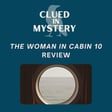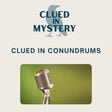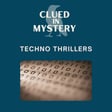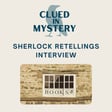Become a Creator today!Start creating today - Share your story with the world!
Start for free
00:00:00
00:00:01

Agatha Christie (part 1)
In the first episode of the Agatha series, we discuss Agatha Christie’s contributions to the genre and a few of her popular sleuths.
RESOURCES Agatha Christie, An Autobiography Agatha Christie (1977) Agatha Christie’s Secret Notebooks: Fifty Years of Mysteries in the Making John Curran (2009) Agatha Christie's Murder in the Making: Stories and Secrets from Her Archive John Curran (2011) Women of Mystery Martha Hailey DuBose (1992) For more information: cluedinmystery.com Instagram: @cluedinmystery Contact us: hello@cluedinmystery.com Music: Signs To Nowhere by Shane Ivers - //www.silvermansound.com
Transcript
Introduction to Hosts and Podcast
00:00:12
Speaker
Okay, welcome to the Clued In Mystery podcast. I'm Sarah. And I'm Brooke, and we both love mystery. Hi Brooke, how are you doing? I'm awesome. How have you been Sarah? Yeah, I'm okay. I'm really excited to talk about Agatha Christie with you today. I know, I'm so excited. We finally are at our first episode. We've been planning this now for a few months and the day is here. Yes, I am very excited. So let's get to it.
00:00:39
Speaker
Should we kick off with a little bit of bio on Dame Agatha?
Agatha Christie's Early Life
00:00:46
Speaker
Yes, absolutely. So I am only going to highlight the basics here because besides being the queen of crime, Agatha led a very exciting and eventful life. Some of those things we'll probably want to revisit in later episodes. So if this wets your appetite for more
00:01:05
Speaker
Check the show notes where we'll list our references. So today in broad strokes, Agatha Mary Clarissa Miller was born September 15th, 1890 in Torquay in England's Devonshire coast. She was born into a well-to-do but not wealthy family. Her parents enjoyed a really close and loving relationship. Agatha even said that she had a perfect childhood, which I thought was really sweet.
00:01:33
Speaker
She was not allowed a traditional education and she actually taught herself to read at the age of four. That's how important words and stories were to her. She wanted to learn to read. Her family lived in Ashfield House and Agatha spent many solitary hours in the large house and on its grounds and it gave her a lot of time to expand her imagination and
00:01:58
Speaker
It's where she created this cast of imaginary friends. And this group, they said, stayed with her most of her life. She had this group of imaginary friends. I love this about Agatha because I too was a kid that had imaginary friends. So I also thought it was so interesting because Agatha had like eight or nine, right? This huge cast of imaginary friends. And I had two. And I thought, of course she did. She loves these
Personal Life and Inspirations
00:02:27
Speaker
multi-character stories after her father's death in 1901 agatha's mother would sometimes let out ashfield house as a means to increase their income by this time agatha and her mother were the only ones at home she her older siblings had already grown up and so she and her mother would travel and stay in a less expensive location
00:02:54
Speaker
while the house is being rented out. And I thought, you know, VRBO, they were pioneers in this VRBO style. And it was also the beginnings of Agatha's love of travel and people watching. She would see how different people interacted because she was put in all these different situations. So I thought that was, we see that come up in her writing, the way that strangers interact, or maybe they're not strangers.
00:03:23
Speaker
As a teen, Agatha did some dating, but she was truly swept off her feet in 1917 when she met Archibald Christie at a dance. He was charming and dashing and he was a military pilot. Biographers say that they had a passionate and yet stormy on again, off again engagement. As a fiction author, you have to think, uh-oh, what kind of foreshadowing do we have here?
00:03:49
Speaker
stormy relationship. Their daughter was born in 1919 and sadly Archie was stationed away for most of the first three years of their marriage so they spent most of that time apart.
00:04:03
Speaker
Though Agatha was writing poetry and different types of prose as early as her teens, she didn't begin mystery fiction until maybe around 1915.
Writing Career and Influence
00:04:15
Speaker
And this was after her sister Madge dared her to try it. I have a sister, so I can imagine this conversation went something like,
00:04:23
Speaker
You couldn't possibly do that. The story became the mysterious Affair It Styles and was eventually published in 1920. And as foreshadowed by that rocky start, Agatha's marriage to Archie ended in 1926. And this was truly a failure to Agatha. You know, she had seen her parents have this very close and sweet marriage and she wanted that too.
00:04:49
Speaker
And thankfully she was destined to have that type of love in her life. She later met Max Malloine a few years later and they enjoyed a long and happy relationship, including lots of trips to Egypt and exotic locations that were perfect settings for writing murder mysteries. And Max was with Agatha when she died peacefully in their home in 1975.
00:05:16
Speaker
at the age of 85. Amazing. I love that she started writing mysteries because her sister dared her to. I know. Isn't that funny? And that it was a popular, it was a popular type of story. You know, they were reading them. It's probably serialized stories. And you can just imagine the conversation over the dinner table. Like, I'd like to try that. And the sister, you know, daring her to.
00:05:46
Speaker
Well, and there are a couple of references to Sherlock Holmes in some of her work. So, you know, I imagine that there was some influence there and certainly that speaks to the popularity of the genre when she was writing. For sure. For sure. That's kind of in my mind when I'm imagining this, I'm thinking that they were probably reading a Sherlock Holmes serialized story.
00:06:14
Speaker
because that was the big name when they were young. I also love that she was influenced by traveling around with her second husband and that experience of being with her mom when they were renting out their house and having various people coming through. I absolutely can see that in her writing because so much of it is about people who are traveling or if you think of
00:06:44
Speaker
murder on the Orient Express or death on the Nile. That's part of the story, right? It's this group of travelers and someone dies. Exactly. The idea that she was getting the opportunity to see various different kinds of people put together in a situation that's not typical for them and then to watch the interaction between these different types of people.
00:07:10
Speaker
She was having those experiences really young, and you're absolutely right. Now when you look at the stories she wrote, you can just see it. It was really interesting to learn more about her past and see how it influenced the stories that she wrote.
Famous Characters and Creative Process
00:07:26
Speaker
So I'm more familiar with her Poirot stories. I think if I've read more of the mysteries that feature him, but I know she's got a couple of other detectives. I know Miss Marple, who I, you know, I don't know if this is right or wrong, but I kind of envision her as Miss Marple.
00:07:47
Speaker
I wondered about that too. Did you learn anything about where she came up with Poirot as a character? Was he one of her imaginary friends that she carried with her?
00:07:59
Speaker
I didn't see anything specific about that. The imaginary friends are a group of eight girls and she was about eight or nine when she came up with this little cast and they're very distinct. I almost got in my head the idea of the little women, how they're kind of like these stereotypical types of girls that were her besties that she had with her.
00:08:25
Speaker
One of the quotes said that she would find herself even in her 60s if she saw a dress in a shop or something and she'd think to herself, oh, that would be perfect for this imaginary friend character that's in her mind. So she definitely carried it through, but they were all girls. So I don't have any idea where Poirot came from. And I think it's interesting. I also read a quote that she said,
00:08:52
Speaker
that he bugged her, like she would get annoyed by him. And it made me laugh because we do all have characters that they become such real people that you have to be true to who they are. But sometimes they get under your skin. I think I've seen something similar or maybe the same quote that yeah, she she kind of grew tired of him.
00:09:13
Speaker
Have you read any of her like Tommy and Tuppence or Parker Pine? Because I'm like you, I probably am the most familiar with Poirot and Miss Marple. Yeah, so I haven't read any of the Tommy Tuppence, but I read one of the Parker Pine short stories and I am not going to remember which one it was right now.
00:09:40
Speaker
I like her short stories, the Poirot short stories, I liked the Parker Pine short story that I've read, Miss Marple short stories, and then some kind of standalone short stories that didn't feature any of her classic detectives. She produced a lot of work. I think we could probably spend days
00:10:06
Speaker
talking about all of the all of the things that she did. And I think like a really broad spectrum of things, like some of the short stories that I read were almost like psychological thriller. And I would say and then there were none was kind of was more of a psychological thriller than a, you know, detective mystery in the way that Poirot or Miss Marple stories are. Right.
00:10:36
Speaker
Yeah. And I, I find myself leaning sometimes towards that style. And I find it fascinating that she was able to do such a good job writing the puzzle mysteries that, you know, a set of clues that leads to the solution. And at the same time, right? Just as high level of a psychological thriller. I, because to me, there are really two separate sets of skills and she could do it all.
00:11:06
Speaker
Exactly. And I think that's really maybe one of the things that makes her continue to be someone that people read and really enjoy, right? Because she captured all those different styles of mystery that people like. And I guess really was one of the pioneers in that, right?
Literary Contributions and Adaptations
00:11:35
Speaker
Right. And when we talk about a body of work, you know, 66 novels, over 130 short stories, over 12 plays, dozens of movies and film adaptations during her lifetime. You know, she was involved in so much of the production and, you know, choosing locations, choosing actors. She really was very involved in a lot of the movie and TV adaptations.
00:12:02
Speaker
The longest running London's West End play ever with mouse trap. I mean she it's her body of work is immense It gives me a lot of hope as somebody who started being serious about writing a little later in life I guess you would say you know, she was still very productive clear into her 70s and so that she was able to continue to create these
00:12:30
Speaker
fascinating stories clear into her later years. And that just gives me a lot of hope. There's a lot of years left for me. Yeah, that's a really good point. There's lots of time. So this is one thing I liked about learning about her work and her life was that she's a mom. She was working another job. She had all the same responsibilities that
00:12:55
Speaker
A lot of us do hoping to do some creative work on the side and she would, she just literally found little short snippets of time to write her stories. She's credited with the quote about the best time to, and I'm paraphrasing, but the best time to work out a plot point is when you're washing the dishes. And, um, you know, in a lot of ways she was just like a normal
00:13:20
Speaker
working mom who was doing her fun hobby of writing on the side and then look what happened. I like that about her. I feel like she's always in her interviews and in her autobiography. She just seemed like a real normal person. I know that probably sounds like such a silly thing to say, but we think of her as this genius author, which she is, but she was really down to earth.
00:13:50
Speaker
I really like that. I mean, I think I agree that the best time to work out a plot point is when you're kind of not really focused on it, right? So yeah, doing the dishes or cleaning the sink or whatever. Folding laundry is, I know I've worked out a couple of things doing that.
00:14:09
Speaker
And it's nice to be reminded that she had a family and other responsibilities. She just wasn't spending all of her time writing. But when you think about everything that she produced, you have to imagine that she spent a lot of time writing to do that.
00:14:31
Speaker
to prepare for this episode. I read, you know, never or reread and read some new stories to me. And I think the, I don't know if I can articulate what it is that I've learned listening to some audio versions and reading some of her stuff. I think there are a couple of things. She talked a lot about how characters look. I'm thinking
00:14:57
Speaker
of Dead Man's Folly actually. It wasn't so much how the character looked, but how one of the characters, you know, everybody else was talking about how dumb this character was. And, you know, it came up so frequently that it was like, okay, well, obviously this is a key point to the story, right? And it ultimately was.
00:15:18
Speaker
And same thing, there was one of the other stories that I read, and I can't remember which one it was right now, but it just kept coming up about how beautiful this particular person was, which again proved to be central to the story.
00:15:37
Speaker
So there were some not so subtle clues, but also some very subtle ones, right? And sort of finding that balance between like, this is really something that you need to know, reader, and I want to make sure that you understand how important this is, versus the thing that's mentioned once almost in passing that proves to be the thing that, you know, Poirot recalls that and
00:16:06
Speaker
that solves the mystery for him, right? And I think she did both of those things, and that's, I think, pretty satisfying as a reader, because it isn't, for me, it isn't so fun to be able to solve everything, right? Like, I want that mystery. That's why I'm reading this, is because I want that mystery, not because I want to prove how good a detective
00:16:32
Speaker
I am. I would have become a police officer if that was what I wanted to do. For sure. Yeah, those are really good points. Then you start to question yourself because sometimes those things that she brings up a lot like the beauty of the woman or sometimes it's the ugliness of a person. So then you start to question yourself like, okay, is this sleight of hand? Is she just trying to make me think that this person is guilty because they're so ugly because
00:17:04
Speaker
So you start to question your own thought processes and then like you said then there's the one-off comment that
00:17:15
Speaker
you might miss, but of course the sleuth is never gonna miss that. And she always does play fair. You know, every clue is there for you. You can go back and find, oh yeah, she did mention that. But yes, I completely agree. Sometimes she is able to find that balance so well between the stuff that she makes completely obvious to the reader and then the stuff that's just thinly veiled and you have to read closely to get the clue.
00:17:44
Speaker
And I really appreciate that. You know, I was thinking about how, particularly in the Playrose stories, we see everything from his perspective, even if it's not him narrating, like, you know, a couple of the stories, it's Hastings.
00:18:05
Speaker
narrating, you know, first person, what happened. But I can't think of any examples of where there's a scene that happens that we don't get to know what Poirot knows, right? Where he's discovered something that, you know, without us having had the same opportunity to discover it, I guess is probably a better way to say that.
00:18:27
Speaker
But what does happen is he sees something that we as the reader or realizes something that we as the reader don't, but we see everything he does. So it just highlights his intellect and his skills at deduction. But yes, you're right. We have the same information that the sleuth does and that's so important because that's a very unsatisfying story to me is when you get to the end.
00:18:56
Speaker
And the sleuth says, well, you know, I know it can't be so and so because, you know, last night this happened. And you're like, wait, that didn't happen on the page. That's not fair. That's that doesn't make that a satisfying reveal to me. But she never did that. She always played fair. Another thing that I found really interesting about her writing is that she isn't consistent in terms of the narrator.
Narrative Styles and Writing Techniques
00:19:21
Speaker
So sometimes it's
00:19:23
Speaker
like I said, Hastings, first person kind of recounting the story. And sometimes it's third person, right? Yeah.
00:19:33
Speaker
you know, none of the characters are the narrator. I mean, I don't know how readers feel about that. That doesn't bother me at all, as long as that's not changing within a book, right? But to have the first couple of books be narrated, you know, by the detective and then
00:19:55
Speaker
subsequent books, narrated, third person, that doesn't really bother me, I think. And clearly there's very good precedent for that. Sure. She definitely does pull it off. I probably fall a little bit more in the camp that like, I don't mind whether it's third or first, but I sort of want that sleuth stories to be told from that point of view.
00:20:22
Speaker
I feel like if it's going to be third, that series should be third. And if it's going to be first, that's just a personal preference. But Christie pulled it off. And I think probably the reason that I have that preference is because there are less skilled writers that don't pull it off. And I think, oh darn, you should have just stayed first person because you wrote so well in first person and then this third fell a little flat. But gosh, the queen of crime doesn't have that problem.
00:20:51
Speaker
She can pull it off no matter which point of view she's riding in, which I don't know how she does that. I feel like most of us have a voice that is better one way or the other, but she definitely can make it work either way.
00:21:06
Speaker
Yeah, I mean, I'm not going to be changing up the narrator in the books that I'm writing, but I have been thinking about, you know, if I were to do a different series, maybe doing that in first person just to see how that goes.
Hosts' Writing Insights
00:21:23
Speaker
Because I actually find myself, I've done this a couple of times where I've been writing a scene and then I've
00:21:28
Speaker
It's supposed to be in third person, but I slip into first. So then I have to go back, obviously, and change that. But I think it is a very different mystery. It's interesting to hear that you do that because, see, I write in first. My series right now is in first. And I feel like you. There could be a time where I want to do something in third. And sometimes when I'm doing my outlining to try to figure out where the story goes, I do those in third.
00:21:58
Speaker
You know, I am, I see it from the outside looking in. And then, um, so it, I think there are, there's like a process there where you, cause you have to see the story maybe from all the different sides. So it's interesting that we both do that, um, maybe in just the story building process. So interesting.
00:22:21
Speaker
Cool.
Episode Preview
00:22:22
Speaker
Well, I think this was a really interesting introduction to Agatha Christie and I look forward to the next episode where we will talk a little bit more about her books and some of the tropes that she kind of popularized and yeah, just do a little bit of a deeper dive.
00:22:45
Speaker
That sounds great, Sarah. I look forward to it. And there's so much more that we have to talk about with Agatha Christie and her contribution. Thanks for joining us today on Clued In Mystery. We'd love to hear what you think. You can reach us at hello at cluedinmystery.com or on social media at cluedinmystery.
00:23:09
Speaker
Clued In Mystery is produced by Brooke Peterson and Sarah M. Stephen. Music is by Shane Ivers at Silvermansound.com. Visit us online at CluedInMystery.com or social media at CluedInMystery. If you liked what you heard, please consider subscribing, leaving a review, or telling your friends.
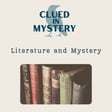
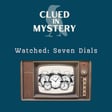
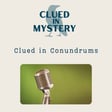
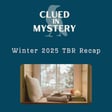
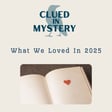
![[Re-release] Anthony Berkeley image](https://media.zencastr.com/cdn-cgi/image/width=112,quality=85/image-files/61e1c276e3ec42007857cff9/e7c778ac-a2ba-4809-9a5c-7cd39d167834.jpg)
![[Bonus] Wake Up Dead Man image](https://media.zencastr.com/cdn-cgi/image/width=112,quality=85/image-files/61e1c276e3ec42007857cff9/e276ac32-e664-464f-956c-7699bdb60aa5.jpg)
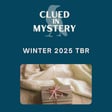

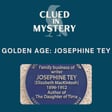
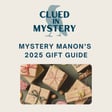
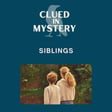

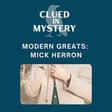
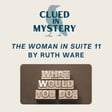
![[Bonus] Read Along: Daughter of Time image](https://media.zencastr.com/cdn-cgi/image/width=112,quality=85/image-files/61e1c276e3ec42007857cff9/b953ad72-c43e-48ca-a18a-b3c216ab90ee.jpg)
